人教版英语九年级复习讲义无答案
Unit14IremembermeetingallofyouinGrade7复习讲义人教版英语九年级

Unit 14 I remember meeting all of you in Grade 7.1.at junior high school在初中2.win a prize得过奖3.do a school survey做学校调查4.do/make a survey (of...) (对......)做调查5. a friend helping me with a problem一个朋友帮助我解决问题6.help sb. with sth.= help sb. (to) do sth.帮助某人做某事7.with the help of sb.(=with one’s help)在某人的帮助下8.without one’s help 没有某人的帮助9.help oneself to sth.随便吃/喝......10.help sb. out 帮助某人解决难题/摆脱困境11.can't/couldn't help doing sth.情不自禁地做某事,忍不住做某事12.meet the standards of a strict teacher达到严师的标准13.the standard of......的标准14.meet the standards达到标准15.be strict with sb.对某人要求严格16.be strict about sth. 对某事要求严格17.score two goals进了两个球18.in a row连续/成一排19.in rows成排,成行地20.during a soccer competition在一场足球比赛中21.learn to do sth. 学会做某事22.learn about了解,知道23.learn (...)from sb.向某人学习(...... )24.learn...by oneself (=teach oneself...)自学25.play the keyboard弹琴(键盘式电子乐器)26.advise sb.(not)to do sth.建议某人(不要)做某事27.advise doing sth.建议做某事28.advise sb. on/about...就......给某人忠告/建议29.take a break from running暂停跑步,休息一下30.take a break from(doing) sth.暂停/中断(做) 某事,休息一下31.take a break=take/have a rest休息32.teaching methods教学方法33.the method of…......的方法34.study medicine学医35.medicine不可数名词医学;医术36.take some/the medicine吃/服药37.medical形容词医学的,医疗的38. a medical student一名医科学生39.give really clear instructions给出很明确的指示40.follow the instructions for遵循......的说明41.instructions on (how to do) sth. (如何做)某事的指示42.instructions to do sth.做某事的指示43.on sb.’s instructions遵照某人的指示44.patient形容词“有耐心的” 可数名词“病人”45.be patient with sb.对某人有耐心46.patience名词“耐心”47.patiently副词“耐心地”48.work out计算;算出49.work out the answers 做出答案50.no matter how=however无论多么;不管怎样51.no matter what=whatever无论什么52.no matter when=whenever无论何时53.no matter where=wherever无论何地54.no matter who=whoever无论谁55.guide sb. to do sth.指导某人做某事56.guide sb. to+ 地点名词指引某人去某地57.much/a lot+比较级......得多58. a bit/a little +比较级稍微......一点儿59.even +比较级甚至......60.倍数分数等表示数量的词可放在比较级前61.encourage动词“鼓励,激励,支持”62.encourage sb. to do sth.鼓励某人做某事63.encourage sb. in sth. ......方面鼓励某人,助长某人的某种行为64.encouragement名词“鼓舞,鼓励”65.put in effort 付出努力66.put in投入,付出,花费(时间、精力等) /插话,安装(设备)67.put in more effort 投入更多的努力68.表建议的句型:69.Shall we +动词原形+其他? 我们做......好吗?70.What/How about doing sth.?做某事怎么样?71.Why not do...?=Why don't you do... ?(你)为什么不做......呢?72.You’d better(not)do...你(们)最好(不)做......73.would like to do sth.想做某事74.Would you like to do...?你(们)想做......吗?75.Let’s (not)do...咱们(不)做......76.Could you please (not) do...?你(们)(不)做......好吗?77.Would you mind (not) doing...?你(们)介意(不)做......吗?78.each of+复数名词/复数人称代词的宾格79.注意:each of后接名词复数时,名词复数前须用定冠词、形容词性物主代词或指示代词等限定词修饰。
Unit1讲义 人教版英语九年级全册

Unit1 How can we become good learners?1.What about reading aloud to practice pronunciation? What about =How about Why don’t you... Why not... Would you like... Let’s...辨析: aloud,loud与loudlyaloud:(adv)大声地(与call,shout,cry等连用)(adv)出声地(与read等连用)Eg: Please read the text aloud.loud: (adj)大声的(可作定语或表语)Eg: The music is too loud.Please turn it down.(adv)响亮地;高声地(与speak,talk,sing,laugh等连用) Eg:Speak loud,please,or no one will hear you.loudly: (adv)高声地(含有喧闹的意味) (与knock,ring等连用) Eg: Suddenly the bell on the wall rang loudly.注意: ①前缀a(n)表示加强意义eg: aright正确地awake唤醒announce宣布;通告②a与名词或动词结合构成形容词/副词Eg: a+sleep (n.睡眠)=asleep (adj睡着的)a+side(n.边)=aside(adv在旁边)a+head(n.头)=ahead(adv在前面)a+live(v居住)=alive(adj活的)2.Why did Wei Fen find it difficult to learn English?此句的结构的: find it+adj+to do sth. 发现做某事...(其中it为形式宾语,真正的宾语是后面的动词不定式.句中adj为宾补)类似的结构还有:①make it+adj+to do sth. 使做某事...②think it+adj+to do sth. 认为做某事...其他几种“find+宾语+宾补”结构①find+宾语+adj 发现某人或某物Eg: She found the work very dull.②find+宾语+adv (其中副词通常是: in,out,up,down,upstairs等) Eg: I went to her house,but I found her out.③find+宾语+介词短语Eg: When he woke up,he found himself in hospital.④find+宾语+doing sth.Eg:Did you find a woman standing under the tree?⑤find+宾语+(to)do sth.Eg: I found Mary (to) clean the classroom.3.I was afraid to ask questions because of my poor pronunciation.辨析: be afraid to do sth.与be afraid of doing sth.be afraid to do sth. 害怕做某事. 根据经验或常识不敢去做某事,或没有勇气去做某事.Eg: He was afraid to go out at night.be afraid of doing sth. 表示担心会发生某事或某情况(但实际上未必会发生),或不敢做某事(指缺乏勇气或因害怕其后果而不敢)Eg: She was afraid of waking up her husband,for he was ill.4.Although I could not understand everything the characters said,... although (conj) 即使;纵然;虽然相当于though,两者可通用(用来引导让步状语从句,既可以位于主句之前,也可以位于主句之后)辨析: although与though①用作连词,表示“虽然”二者可互换,但although与though 更加正式.在同一个句子中,although与though不能与but连用,但可以与yet 连用.Eg: Although he was tired,he went on working.②Although一般不用作adv,而though可作adv,且一般位于句末,译为:可是;不过.Eg: It’s hard work;I enjoy it,though.③as though(好像;仿佛),even though(即使;纵然)等固定短语中。
2021-2022学年八年级升九年级英语人教版暑假专题讲义:非谓语动词(无答案)
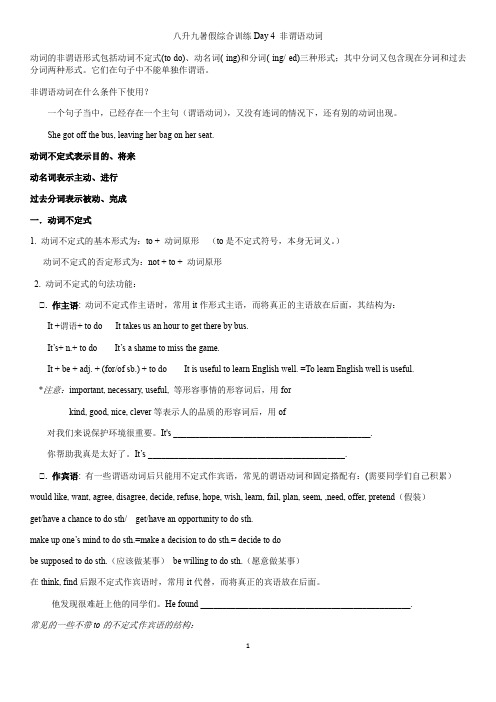
八升九暑假综合训练Day 4 非谓语动词动词的非谓语形式包括动词不定式(to do)、动名词(-ing)和分词(-ing/-ed)三种形式;其中分词又包含现在分词和过去分词两种形式。
它们在句子中不能单独作谓语。
非谓语动词在什么条件下使用?一个句子当中,已经存在一个主句(谓语动词),又没有连词的情况下,还有别的动词出现。
She got off the bus, leaving her bag on her seat.动词不定式表示目的、将来动名词表示主动、进行过去分词表示被动、完成一.动词不定式1. 动词不定式的基本形式为:to + 动词原形(to是不定式符号,本身无词义。
)动词不定式的否定形式为:not + to + 动词原形2. 动词不定式的句法功能:①. 作主语: 动词不定式作主语时,常用it作形式主语,而将真正的主语放在后面,其结构为:It +谓语+ to do It takes us an hour to get there by bus.It’s+ n.+ to do It’s a shame to miss the game.It + be + adj. + (for/of sb.) + to do It is useful to learn English well. =To learn English well is useful.*注意:important, necessary, useful, 等形容事情的形容词后,用forkind, good, nice, clever等表示人的品质的形容词后,用of对我们来说保护环境很重要。
It's _____________________________________________.你帮助我真是太好了。
It’s _____________________________________________.①. 作宾语: 有一些谓语动词后只能用不定式作宾语,常见的谓语动词和固定搭配有:(需要同学们自己积累)would like, want, agree, disagree, decide, refuse, hope, wish, learn, fail, plan, seem, ,need, offer, pretend(假装)get/have a chance to do sth/ get/have an opportunity to do sth.make up one’s mind to do sth.=make a decision to do sth.= decide to dobe supposed to do sth.(应该做某事)be willing to do sth.(愿意做某事)在think, find后跟不定式作宾语时,常用it代替,而将真正的宾语放在后面。
人教版九年级英语中考复习词性转换复习题(无答案)

人教版九年级英语中考复习词性转换复习题(无答案)人教版九年级英语词性转换复习题词形转换总复习1.able adj.能够;有能力的________________ n. 能力;才能2.pronounce v. .________________n.发音3.add v. 加上_____________ n. 增加4.age n. 年龄 ____ adj. 上了年龄的5.agree v. 同意____________ n. 同意___________ v. 不同意6.live v. 居住________ adj.(表语)活着的_________ adj. (定语)_________ adj. 栩栩如生的7.angry adj. 生气的_____________ adv. 生气地____________ n. 生气8.appear v. 出现 ___________ v. 消失___________ n. 外表9.argue v. 争吵 _________ n. 争吵10.art n. 艺术_______________ n. 艺术家11.assist v. 帮助______ n. 助手12.attract v. 吸引_______ n. 吸引力;吸引物______________ adj. 有吸引力的13.Australia n. 澳大利亚 _____ adj. 澳大利亚的14.beautiful adj. 美丽的 ____ adv. 优美地15.begin v. 开始;着手____ n. 开始;开端16.well-known adj. 著名的 ______(最高级)17.breath n. 呼吸 _____ v. 呼吸18.Britain n. 英国______ n. 英国人19.build v. 建造;建筑_____________ n. 建筑物__________ v. 重建____________ n. 建造者20.busy adj. 繁忙的______________ n. 生意___________ n. 男商人__________ 女商人21.calculate v. 计算____________ n. 计算___________ n. 计算器22.Canada n. 加拿大_____________ n. 加拿大人23.care n. 小心___________ adj. 小心的___________ adj. 不小心的___________ adv. 小心地24.celebrate v. 庆祝_____________ n. 庆祝25.change v. 改变;更改________________ adj. 易变的;可变的________________ v. 交换,交流26.chemical adj. 化学的____________ n. 化学____________ n. 化学家27.choose v. 选择__________ __________(过去时,过去分词)____________ n. 选择28.city n. 城市____________ n. 市民29.clean adj. 干净的,清洁的__________ _________(比较级,最高级)30.collect v. 收集_____________ n. 收集31.comfort n. 舒服 _____ adj. 舒服的 ___ adv. 舒服地________ adj. 不舒服的____ adv. 不舒服地32.communicate v. 交流________________ n. 交流33.complain v. 抱怨;投诉_______________ n. 抱怨;投诉34.complete adj. 完整的,完全的 ___________ adv. 完整地,完全地___ adv. 不完整地,不完全地35.conclude v. 下结论_______________ n. 结论36.connect v. 连接______________ n. 连接37.correct adj. 正确的__________ adj. 不正确的__________ adj. 正确地38.create v. 创造;创作 _______ n. 创造,创作____ n. 创造者____ adj. 有创造力的39.danger n. 危险_____________ adj. 危险的40.dark adj. 黑暗的_____________ n. 黑暗41.die v. 死亡___________ adj. 死了的___________ adj. 垂死的___________ n. 死亡42.decide v. 决定_____________ n. 决定43.depart v. 离开___________ n. 部门_____________ n. 离开44.destroy v. 破坏______________(过去式)45.develop v. 发展,开发 _________ n. 发展 _____ adj. 发展中的______ adj. 发达的46.different adj. 不同的_____________ n. 差异47.difficult adj. 困难的______________ n. 困难48.cover v. 覆盖___________ v. 发现49.discuss v. 讨论_____________ n. 讨论50.honest adj. 诚实的___________ n. 诚实____________ adj. 不诚实的51.electric adj. 电的___________ n. 电____________ adj. 电子的52.engine n. 引擎_____________ n. 工程师53.enjoy v. 欣赏;喜欢_____________ adj. 使人愉快的54.enter v. 进入;参加_____________ n. 入口55.Europe n. 欧洲_______________ n. 欧洲人56.exam n. 考试 ____________ v. 检查,细查57.explain v. 解释_____________ n. 解释58.energy n. 能量_____________ adj. 精力充沛的59.fail v. 失败_____________ n. 失败60.favour n. 恩惠_____________ adj. 最喜爱的61.feel v. 感觉_____________ n. 感觉62.fish v. 钓鱼______________ n. 钓鱼的人63.fly v. 飞____________ n. 飞行_____________ adj. 飞行中的64.foreign adj. 外国的______________ n. 外国人65.France n. 法国______________ n. 法国人66.free adj. 自由的,免费的___________ adv. 自由地____________ n. 自由67.freeze v. 结冰_____________ adj. 冻结的,寒冷的_____________ adj. 冰冻的68.friend n. 朋友___________ adj. 友好的__________ n. 友谊69.frighten v. 使害怕___________ adj. 受惊吓的________ adj. 恐怖的70.gentle adj. 温柔的___________ adv. 轻柔地___________ n. 绅士71.___________ n. 德国____________ n. 德国人72.gold n. 黄金_____________ adj. 金色的73.happy adj. 快乐的__________ adv. 快乐地____________ n. 快乐_________ adj. 不幸的_________ adv. 不幸地___________ n. 不幸74.harm n. 伤害____________ adj. 有伤害的____________ adj. 无害的______ adv. 有害地75.health n. 健康___________ adj. 健康的______ adv. 健康地______ adj. 不健康的 ______ adv. 不健康地76.high adj. 高的____________ n. 高度77.help v. 帮助____________ adj. 有帮助的___________ adj. 无助的78.history n. 历史_____________ adj. 历史上的79.home n. 家____________ adj. 无家可归的80.hungry adj. 饥饿的____________ n. 饥饿___________ adv. 饥饿地81.hurry v. 赶紧____________ adj. 急急忙忙的___________ adv. 匆忙地82.ill adj. 有病的_________ n. 疾病________(比较级) ________(最高级) 83.important adj. 重要的____________ n. 重要性84.possible adj. 可能的__________ adv. 可能地__________ n. 可能性 __________ adj. 不可能的85.Introduce v. 介绍___________ n. 介绍86.invent v. 发明,创造__________ n. 发明物__________ n. 发明家87.invite v. 邀请_____________ n. 邀请88.Italy n. 意大利_____________ n. 意大利人89.kind adj. 友好的,和善的______________ n. 仁慈90.know v. 知道,了解_________________ n. 知识91.late adj. / adv. 晚,迟___________ adv. 后来92.laugh v. 笑_____________ n. 笑声93.long adj. 长的_______________ n. 长度94.library n. 图书馆______________ n. 图书管理员95.little adj. 少的;小的__________(比较级)___________(最高级)96.luck n. 幸运__________ adj. 幸运的___________ ad地 _____ adj. 不幸的 _____ adv. 不幸地97.mean v. 意味着___________ n. 意义___________ adj. 有意义的98.medicine n. 药_______ adj. 医疗的99.mix v. 混合______________ n. 混合物100.mouse n. 老鼠______________(复数)101.nation n. 国家,民族___________ adj. 国家的 ______ n. 国籍____ adj. 本土的 _______ adj. 国际的102.nature n. 大自然_____________ adj. 自然的103.need v. 需要 ______ adj. 必需的 ________ adj. 不需要的104.noise n. 噪声__________ adj. 嘈杂的____________(比较级)____________ adv. 嘈杂地105.office n. 办公室__________ n. 官员___________ adj. 官方的106.operate v. 开刀 _________ n. 手术107.organize v. 组织 _______ n. 组织,团体108.paint v. 绘画____________ n. 画家______________ n. 油画109.pass v. 通过_____________ n. 乘客110.patient adj. 耐心的_____ adj. 不耐心的 _____ n. 耐心111.peace n. 和平 _____ adj. 和平的 ______ adv. 和平地112.physics n. 物理_______ adj. 身体的113.please v. 请___________ adj. 令人愉快的__________ adj. 感到愉快的___________ n. 愉快114.polite adj. 有礼貌的____________ adj. 没礼貌的_____ adv. 有礼貌地______________ n. 礼貌115.pollute v. 污染________________ n. 污染116.pop adj. 流行的___________ adj. 受欢迎的___________n. 人口117.possible adj. 可能的_____________ adv. ___________ adj. 不可能的_____________ n. 可能性118.power n. 电源_______________ adj. 强大的119.produce v. 生产____________n. 产品_____________ n. 生产120.pride n. 自豪_____________ adj. 骄傲的121.rain v. 下雨 ______ adj. 多雨的122.real adj. 真的___________ adv. 真地______ v. 实现123.report n. 报告 _____ n. 记者124.response n. 反应____________ adj. 负责的125.review v. 复习 _____ n. 复习126.sad adj. 悲伤的____________ v. 难过地___________ n. 悲伤127.safe adj. 安全的 _____ v. 保存 _______ adv. 安全地 ______ n. 安全 _____ adj. 不安全的128.sell v. 卖__________(过去式) ___________ (过去分词)____ n. 销售_____________ n. 销售员129.science n. 科学____________ n. 科学家____________ adj. 科学的130.season n. 季节____________ adj. 季节性的131.two __________ n. 第二_____________ adj. 中等的____________ adv. 两次132.serve v. 为……服务____________ n. 服务_____________ n. 佣人133.silent adj. 沉默的____________ adv. 沉默地____________ n. 沉默134.sleep v. 睡觉___________ adj. 犯困的____________ adj. 睡着的135.solve v. 解决____________ n. 解决方法136.sing v. 唱歌__________ (过去式) ___________ (过去分词) _____________ n. 歌137.speak v. 说话_________ (过去式) __________ (过去分词) ___________ n. 讲话者_____________ n. 演讲138.spell v. 拼写___________ (过去式) ______________ n. 拼写139.succeed v. 成功__________ n. 成功____________ adj. 成功的_____________ adv. 成功地140.suggest v. 建议______________ n. 建议141.sun n. 太阳___________ adj. 阳光普照的142.surprise n. 惊奇__________ adj. 感到惊奇___________ adj. 令人惊奇143.taste v. 尝_____________ adj. 好吃的144.swim v. 游泳__________ (过去式) ____________ (过去分词) _____________ n. 游泳145.thank v. 感谢____________ adj. 感激的146.think v. 认为_________ (过去式) ____________ n. 思想_____________ n. 思考者147.tidy adj. 整洁的_____________ adj. 不整洁的_________ adv. 整洁地148.tour n. 旅行_____________ n. 游客149.translate v. 翻译_____________ n. 翻译___________ n. 翻译家150.true adj. 真实的____________ adv. 真实地___________ n. 真相151.turn v. 转动,转变 _______ v. 回归152.type v. 打字 _____ n. 打字机 ______ n. 打字员153.use v. 使用 ___ adj. 有用的 ____ adj. 没用的154.usual adj. 通常的 ___ adv. 经常 __ adj. 不寻常的155.visit v. 拜访_____________ n. 参观者156.wait v. 等待 _____ n. 男服务员 ______ n. 女服务员157.weigh v. 称……的重量______ n. 重量158.west n. 西方_______ adj. 西方的159.wide adj. 宽的___________ adv. 宽阔地____________ v. 拓宽_____________ n. 宽度160.win v. 获胜___________ (过去式) ___________ (过去分词) _____________ n. 胜者161.wise adj. 智慧的____________ n. 智慧162.wonder v. 想知道____________ adj. 精彩的163.wood n. 木头_____________ adj. 木质的164.write v. 写___________ (过去式) ____________ (过去分词)____________ n. 作家。
Unit4讲义 人教版英语九年级全册
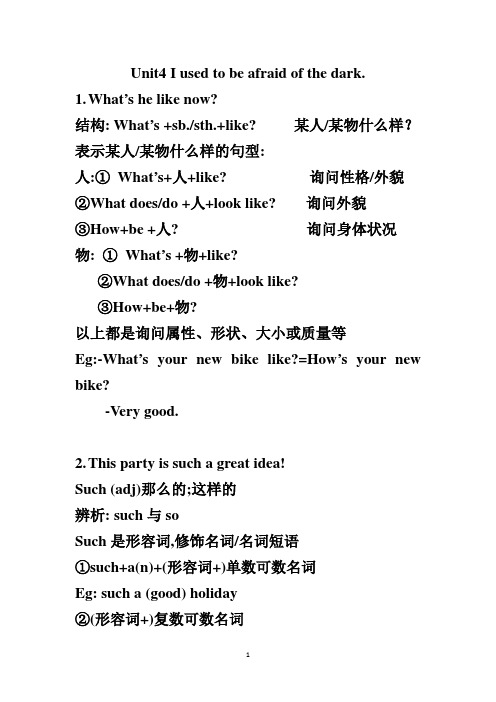
Unit4 I used to be afraid of the dark.1.What’s he like now?结构: What’s +sb./sth.+like? 某人/某物什么样?表示某人/某物什么样的句型:人:①What’s+人+like? 询问性格/外貌②What does/do +人+look like? 询问外貌③How+be +人? 询问身体状况物: ①What’s +物+like?②What does/do +物+look like?③How+be+物?以上都是询问属性、形状、大小或质量等Eg:-What’s your new bike like?=How’s your new bike?-Very good.2.This party is such a great idea!Such (adj)那么的;这样的辨析: such与soSuch是形容词,修饰名词/名词短语①such+a(n)+(形容词+)单数可数名词Eg: such a (good) holiday②(形容词+)复数可数名词Eg: such (beautiful) girls③(形容词+)不可数名词Eg: such (delicious) foodSo是副词,修饰形容词/副词Eg: so careful so carefully注意: 当名词前有many,much,few,little 等词修饰时,只能用so,不能用such.Eg: She will have so much housework to do tomorrow Such+a(n)+adj+可数名词单数=so+adj+a(n)+可数名词单数Eg:It is so interesting a book that I like it very much. It is such an interesting book that I like it very much.3.As she got better,she dared to sing in front of her class,and then for the whole school.dare (实义动词) 敢于;胆敢(可以有词形变化) Eg: I wonder how he dares to say such things.dare(情态动词) 敢(通常用于疑问句/否定句及if/whether之后,一般不用于肯定句)Eg:Dare you tell her the truth?I don’t know whether he dare try.“I dare say”习惯说法(用于肯定句) 所表示的是一种不确定的语气,常译为:很可能、大概、我想等Eg: I dare say you are right. 我想你是正确的4.Now she’s not shy anymore and loves singing in front of crowds.Not...anymore=not...any more 相当于no more(一般指行为/动作不再出现)辨析: not...any more 与not...any longernot...any more 相当于no more,表示数量和程度上的“不再”,通常修饰非延续性动词,一般指今后“不再”,故多用于将来时Eg: He will not go there any more.He will no more go there.not...any longer 相当于no longer 指时间上/距离上的“不再延长”,通常修饰延续性动词,多指现在的情况与过去相比,故常用于现在时态Eg: You can’t stay here any longer.You can no longer stay here.5.You really require a lot of talent and hard work to succeed.require (v) 需要;需求requirement (n)要求;规定用法如下:①require sb.to do sth. 要求某人做某事②require that+sb.(should) do sth. 要求某人做某事③sth. require doing /to be done.某事需要(被)做6.Only a very small number of people make it to the top.a very small number of 极少数后接复数名词(谓语动词用复数形式) a small number of 少数辨析: a number of 与the number ofa number of +复数名词许多the number of +复数名词...的数量(谓语用单数) 7.Sometimes he was absent from classes and failed his examinations.absent (adj) 缺席的;不在场的(常与from连用) be absent from 缺席absence (n) 缺席(反义词: presence )present(adj)出席的;在场的(后置定语)(adj)目前的;现在的(前置定语)fail (vt) 失败;不及格(vi) 失败;不及格~ to do sth. 未能/没能做成某事Eg: The boy didn’t fail (in) the exam.8.She advised them to talk with their son in person. advise sb. (not) to do sth. 建议某人(不)做某事advise的用法如下:①~doing sth. 建议做某事②~ that +从句建议... (that引导的从句应用虚拟语气,即:should+动原,should可以省略)advice(un) 建议;忠告 a piece of advice 一条建议9.So he became less interested in studying and missed classes.辨析: become,turn与getbecome:变得;成为(通常指身份、职位的变化,强调变化的过程已完成)Eg: She became an English teacher.turn: 变成(多用于在颜色或性质等方面的变化,强调变化的结果)Eg: The man turned blue with fear. (那个人吓得脸色发青)get:变得(多用于口语,表示一种变化过程,强调“渐渐变得”, 其后常接adj的比较级)Eg: In winter,the days get shorter.Used to的用法:used to+动原表示过去的习惯性动作或状态,现在已不再发生或不存在.否定句: used not to, usedn’t to, didn’t use toEg: She didn’t use to have long hair.She usedn’t to have long hair.一般疑问句: Did e to...? /Used sb.to...?Yes,sb.did. /Yes,ed to. No,edn’t 反意疑问句: 附加问句部分可用didn’t/usedn’t类似短语:be/get/become used to doing sth.习惯于做某事be used to do sth. 被用于做某事。
人教版新目标英语九年级 Unit 5 单词补充,知识点复习总结(无答案)
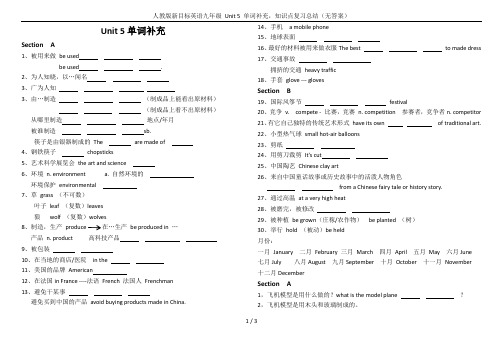
Unit 5单词补充Section A1、被用来做be usedbe used .2、为人知晓,以…闻名3、广为人知3、由…制造(制成品上能看出原材料)(制成品上看不出原材料)从哪里制造地点/年月被谁制造sb.筷子是由银器制成的The are made of4、钢铁筷子chopsticks5、艺术科学展览会the art and science6、环境n. environment a. 自然环境的环境保护environmental7、草grass (不可数)叶子leaf (复数)leaves狼wolf (复数)wolves8、制造,生产produce 在…生产be produced in …产品n. product 高科技产品9、被包装10、在当地的商店/医院in the11、美国的品牌American12、在法国in France ----法语French 法国人Frenchman13、避免干某事避免买到中国的产品avoid buying products made in China.14、手机 a mobile phone15、地球表面16、最好的材料被用来做衣服The best to made dress17、交通事故拥挤的交通heavy traffic18、手套glove --- glovesSection B19、国际风筝节festival20、竞争v. compete - 比赛,竞赛n. competition 参赛者,竞争者n. competitor21、有它自己独特的传统艺术形式have its own of traditional art.22、小型热气球small hot-air balloons23、剪纸24、用剪刀裁剪It's cut25、中国陶艺Chinese clay art26、来自中国童话故事或历史故事中的活泼人物角色from a Chinese fairy tale or history story.27、通过高温at a very high heat28、被磨完,被修改29、被种植be grown(庄稼/农作物)be planted (树)30、举行hold (被动)be held月份:一月January 二月February 三月March 四月April 五月May 六月June 七月July 八月August 九月September 十月October 十一月November 十二月DecemberSection A1,飞机模型是用什么做的?what is the model plane ?2,飞机模型是用木头和玻璃制成的。
最新人教版九年级英语复习资料全册全套
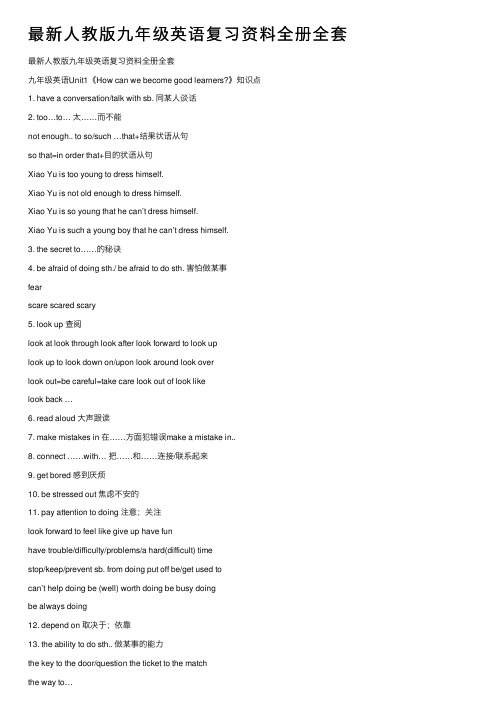
最新⼈教版九年级英语复习资料全册全套最新⼈教版九年级英语复习资料全册全套九年级英语Unit1《How can we become good learners?》知识点1. have a conversation/talk with sb. 同某⼈谈话2. too…to… 太……⽽不能not enough.. to so/such …that+结果状语从句so that=in order that+⽬的状语从句Xiao Yu is too young to dress himself.Xiao Yu is not old enough to dress himself.Xiao Yu is so young that he can’t dress himself.Xiao Yu is such a young boy that he can’t dress himself.3. the secret to……的秘诀4. be afraid of doing sth./ be afraid to do sth. 害怕做某事fearscare scared scary5. look up 查阅look at look through look after look forward to look uplook up to look down on/upon look around look overlook out=be careful=take care look out of look likelook back …6. read aloud ⼤声跟读7. make mistakes in 在……⽅⾯犯错误make a mistake in..8. connect ……with… 把……和……连接/联系起来9. get bored 感到厌烦10. be stressed out 焦虑不安的11. pay attention to doing 注意;关注look forward to feel like give up have funhave trouble/difficulty/problems/a hard(difficult) timestop/keep/prevent sb. from doing put off be/get used tocan’t help doing be (well) worth doing be busy doingbe always doing12. depend on 取决于;依靠13. the ability to do sth.. 做某事的能⼒the key to the door/question the ticket to the matchthe way to…14. good learners 优秀的学习者15. work with friends 和朋友⼀起学习work in groups16. study for a test 备考17.speaking skills ⼝语技巧spoken English英语⼝语18.a little=a bit=a little bit=kind of 有点⼉19.at first 起初起先first of all at the beginning ofto start with20.because of 因为because +原因状语从句21.as well 也,too, eitheralso22.the meaning of ……的意思What’s the meaning of the word?What does the word mean?What do you mean by the word?23.in common 共有的have… in common24.for example 例如for instancesuch as列举25.think about 考虑think over 仔细考虑think hard 苦苦思索think of26.even if/though 即使尽管纵容27.worry about=be worried about 担⼼担忧be nervous about be anxious about be excited aboutbe serious about be relaxed about28.make word cards 制作单词卡⽚29.ask the teacher for help 向⽼师求助ask for30.give a report 作报告31.word by word ⼀字⼀字地little by little one by onestep by step32.fall in love with 爱上fall-fell-fallenfall down 跌倒fall down from= fall off从..掉下来fall over 绊倒fall into 落⼊33.something interesting 有趣的事情修饰不定代词的形容词后置不定代词作主语谓语动词⽤单三34.take notes 记笔记write down35.how often 多久⼀次How soon多久以后How longHow far How much How many..36.a lot of=lots of= plenty of 许多37.learning habits 学习习惯eating habbits38.be interested in=take an interest in 对……感兴趣39.be good at=do well in 在……⽅⾯擅长be bad at do badly in be weak in40.each other 彼此互相one another41.instead of +n./pron./doing 代替⽽不是42. by doing sth 通过做某事43.it +be+adj/n.+for(of) sb.+to do sth 做某事是……的44.finish doing sth 完成某事finish/practice/enjoy/mind/ suggest/avoid/consider/stand45.what/how about doing sth?做某事怎么样?46.try to do sth 尽⼒做某事try one’s best to dotry doing try on try out47.the +⽐较级,the+⽐较级越……,就越……⽐较级+and +⽐较级as…as not as… as48.find it+adj+to do sth 发现做某事49.help sb (to) do sth 帮助某⼈做某事help-helpfulhelp sb. with give sb. a hand= do sb. a favorhelp out help oneself 请⾃便with the help of sb. == with one's help 在某⼈的帮助下50.keep doing sth ⼀直做某事keep sb. +adj.51.begin/start to do sth 开始做某事begin/start doing sth.52.want to do sth.=would like to do=feel like doing 想要做某事53.need to do sth 需要做某事need doing=need to be done54.remember to do sth 记得做某事remember doing sth.forget to do sth forget doing sth55. 提建议的句⼦:①What/ how about +doing sth.? 做…怎么样?(about后⾯要⽤动词的ing形式,这⼀点考试考的⽐较多)如:What/ How about going shopping?②Why don't you + do sth.? 你为什么不做…?(注意加⿊的部分⽤的是动词的原型)如:Why don't you go shopping?③Why not + do sth. ? 为什么不做…?(注意加⿊的部分⽤的是动词的原型)如:Why not go shopping?④Let's + do sth. 让我们做…吧。
unit10暑假预习辅导学案(五课时)(无答案)2021-2022学年人教版英语九年级全册
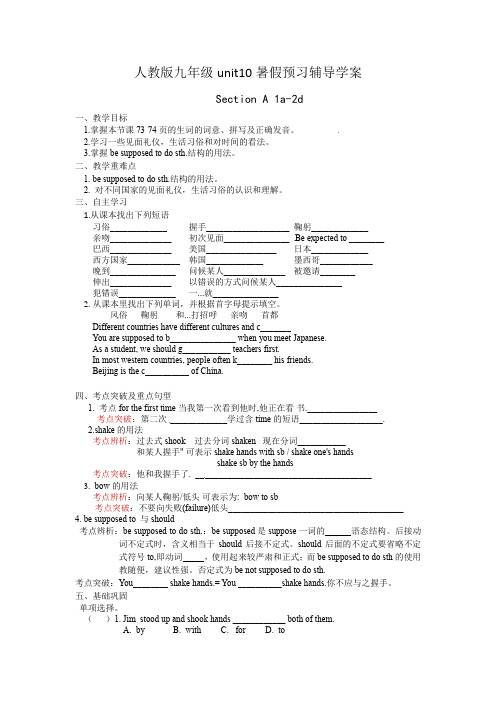
人教版九年级unit10暑假预习辅导学案Section A 1a-2d一、教学目标1.掌握本节课73-74页的生词的词意、拼写及正确发音。
2.学习一些见面礼仪,生活习俗和对时间的看法。
3.掌握be supposed to do sth.结构的用法。
二、教学重难点1. be supposed to do sth.结构的用法。
2. 对不同国家的见面礼仪,生活习俗的认识和理解。
三、自主学习1.从课本找出下列短语习俗_____________ 握手___________________ 鞠躬_____________亲吻______________ 初次见面_______________ Be expected to ________巴西______________ 美国________________ 日本_____________西方国家____________ 韩国_____________ 墨西哥____________晚到_______________ 问候某人______________ 被邀请________伸出______________ 以错误的方式问候某人_______________犯错误_____________ 一...就_______________2.从课本里找出下列单词,并根据首字母提示填空。
风俗鞠躬和...打招呼亲吻首都Different countries have different cultures and c_______You are supposed to b_______________ when you meet Japanese.As a student, we should g___________ teachers first.In most western countries, people often k________ his friends.Beijing is the c__________ of China.四、考点突破及重点句型1.考点for the first time当我第一次看到他时,他正在看书.________________考点突破:第二次_____________学过含time的短语___________________.2.shake的用法考点辨析:过去式shook过去分词shaken现在分词___________和某人握手"可表示shake hands with sb/shake one's handsshake sb by the hands考点突破:他和我握手了.________________________________________3.bow的用法考点辨析:向某人鞠躬/低头可表示为:bow to sb考点突破:不要向失败(failure)低头________________________________________4. be supposed to 与should考点辨析:be supposed to do sth.:be supposed是suppose一词的语态结构。
2022人教版九年级英语unit7--8单元重难点复习+同步测试无答案
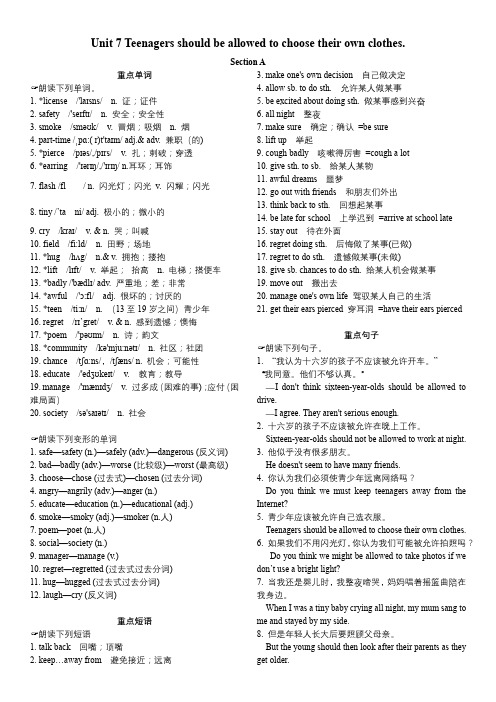
Unit 7 Teenagers should be allowed to choose their own clothes.Section A重点单词✍朗读下列单词。
1. *license /'laɪsns/ n. 证;证件2. safety /'seɪftɪ/ n. 安全;安全性3. smoke /sməʊk/ v. 冒烟;吸烟n. 烟4. part-time /ˌpɑ:( r)t'taɪm/ adj.& adv. 兼职(的)5. *pierce /pɪəs/,/pɪrs/ v. 扎;刺破;穿透6. *earring /'ɪərɪŋ/,/'ɪrɪŋ/ n.耳环;耳饰7. flash /fl/ n. 闪光灯;闪光v. 闪耀;闪光8. tiny /’ta ni/ adj. 极小的;微小的9. cry /kraɪ/ v. & n. 哭;叫喊10. field /fi:ld/ n. 田野;场地11. *hug /hʌg/ n.& v. 拥抱;搂抱12. *lift /lɪft/ v. 举起;抬高n. 电梯;搭便车13. *badly /'bædlɪ/ adv. 严重地;差;非常14. *awful /'ɔ:fl/ adj. 很坏的;讨厌的15. *teen /ti:n/ n. (13至19岁之间)青少年16. regret /rɪ’gret/ v. & n. 感到遗憾;懊悔17. *poem /'pəʊɪm/ n. 诗;韵文18. *community /kə'mju:nətɪ/ n. 社区;社团19. chance /tʃɑ:ns/,/tʃæns/ n. 机会;可能性18. educate /'edʒʊkeɪt/ v. 教育;教导19. manage /'mænɪdʒ/ v. 过多成(困难的事);应付(困难局面)20. society /sə'saɪətɪ/ n. 社会✍朗读下列变形的单词1. safe—safety (n.)—safely (adv.)—dangerous (反义词)2. bad—badly (adv.)—worse (比较级)—worst (最高级)3. choose—chose (过去式)—chosen (过去分词)4. angry—angrily (adv.)—anger (n.)5. educate—education (n.)—educational (adj.)6. smoke—smoky (adj.)—smoker (n.人)7. poem—poet (n.人)8. social—society (n.)9. manager—manage (v.)10. regret—regretted (过去式过去分词)11. hug—hugged (过去式过去分词)12. laugh—cry (反义词)重点短语✍朗读下列短语1. talk back回嘴;顶嘴2. keep…away from避免接近;远离3. make one's own decision自己做决定4. allow sb. to do sth.允许某人做某事5. be excited about doing sth. 做某事感到兴奋6. all night整夜7. make sure确定;确认=be sure8. lift up举起9. cough badly咳嗽得厉害=cough a lot10. give sth. to sb.给某人某物11. awful dreams噩梦12. go out with friends和朋友们外出13. think back to sth.回想起某事14. be late for school上学迟到=arrive at school late15. stay out待在外面16. regret doing sth.后悔做了某事(已做)17. regret to do sth.遗憾做某事(未做)18. give sb. chances to do sth. 给某人机会做某事19. move out搬出去20. manage one's own life 驾驭某人自己的生活21. get their ears pierced 穿耳洞=have their ears pierced重点句子✍朗读下列句子。
Unit 1 单元词汇复习详解-人教版九年级英语全册
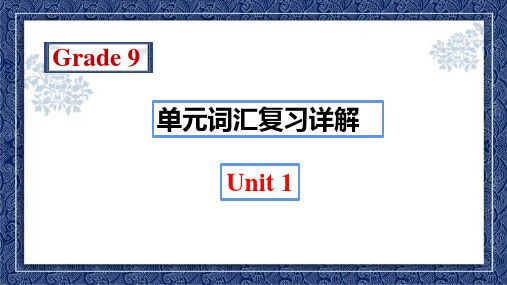
will get.
A. the more careless B.the more careful
C. the harder
D. the worse
4. Just search the Internet and you can get almost all the B you need.
A. message B. information C. picture D. story
Explaination
辨析: connect A with B & connect A to B 1. 用with指把A与B连接在一起,A、B之间不分主次。
Tim connected this(电线) wire with that one. 2. 用to指把A连接在B上,说话者以B为主,为A为辅。
Exercises
根据句意及汉语和首字母提示填写单词 1. The pain in his leg made him cry a loud (大声 地). 2. Dave had a long c onversation (谈话)on the phone with his teacher
yesterday. 3. —Mom, I forgot where I put my t extbook ( 课本) .Could you help me
pronounce n. pronunciation n. 发音;读法 I don't know how to pronounce this word. We should practice pronunciation every morning.
Explaination1. increase vi.
—I learn English D practicing conversations with friends.
2021-2022学年人教版英语九年级全册 Unit10 期末复习知识点详解与训练

2021-2022学年人教版英语九年级全Unit10期末复习知识点详解与训练一、知识点详解Section A1.In your country, what are you supposed to do when you meet someone for the first time?(1)be supposed to do sth 被期望做某事,应该做......,表示劝告、建议、责任等,=should =“to be expected to do sth,例:You are supposed to arrive on time(2)for the first time 首先,第一次【辨析】at first/first of all1) at first = at the beginning 最初,开始。
强调在时间顺序或做某事过程等开始之初2) first of all 首先,第一。
表明陈述事情的重要性【有关time的短语】in time 及时on time 准时have a good time玩得开心all the time一直,总是take one’s time 从容不迫kill the time:消磨时间at times 不时from time to time有时at that time 在那时at the same time 同时2.You’re supposed to shake hands 你应该握手。
shake→shook→shaken v 摇动,震动shake hands 握手shake hands with sb./ shake one's hands与某人握手例:You should shake hands with her when you meet her.3.In the United States, they’re expected to shake hands. 在美国,他们应该握手。
2020年人教版英语九年级unit4全单元学案(无答案)
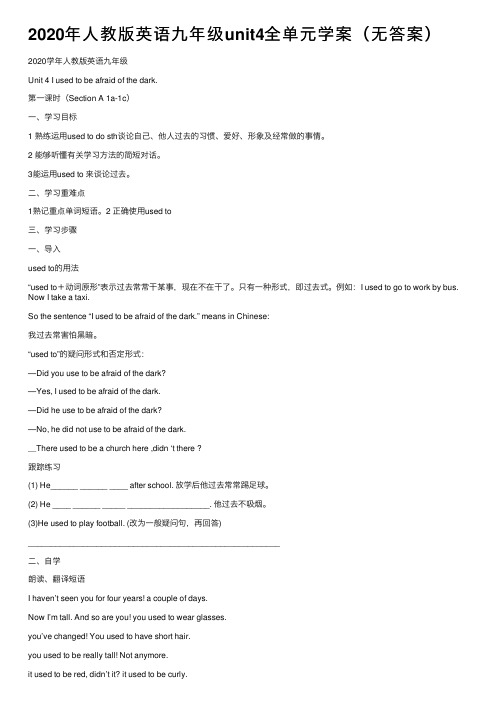
2020年⼈教版英语九年级unit4全单元学案(⽆答案)2020学年⼈教版英语九年级Unit 4 I used to be afraid of the dark.第⼀课时(Section A 1a-1c)⼀、学习⽬标1 熟练运⽤used to do sth谈论⾃⼰、他⼈过去的习惯、爱好、形象及经常做的事情。
2 能够听懂有关学习⽅法的简短对话。
3能运⽤used to 来谈论过去。
⼆、学习重难点1熟记重点单词短语。
2 正确使⽤used to三、学习步骤⼀、导⼊used to的⽤法“used to+动词原形”表⽰过去常常⼲某事,现在不在⼲了。
只有⼀种形式,即过去式。
例如:I used to go to work by bus. Now I take a taxi.So the sentence “I used to be afraid of the dark.” means in Chinese:我过去常害怕⿊暗。
“used to”的疑问形式和否定形式:—Did you use to be afraid of the dark?—Yes, I used to be afraid of the dark.—Did he use to be afraid of the dark?—No, he did not use to be afraid of the dark._There used to be a church here ,didn ‘t there ?跟踪练习(1) He______ ______ ____ after school. 放学后他过去常常踢⾜球。
(2) He ____ ______ _____ __________________. 他过去不吸烟。
(3)He used to play football. (改为⼀般疑问句,再回答)_______________________________________________________⼆、⾃学朗读、翻译短语I haven’t seen you for four years! a couple of days.Now I’m tall. And so are you! you used to wear glasses.you’ve changed! You used to have short hair.you used to be really tall! Not anymore.it used to be red, didn’t it? it used to be curly.You used to be short, didn’t you? 复习反意疑问句,完成练习:(1)Lily will go to China, ______ _____?(2)She doesn’t come from China, ________ ________?(3) You haven’t finished homework, _________ __ ?(4) He knows little English, _________ ______?三、交流注意谈论外貌和性格的不同句型What’s he\ she like ?What does he\ she look like?完成1a两⼈⼀组谈论⾃⼰过去的外表、性格等及与现在的不同。
新人教版九年级(全一册)英语 Unit 8 It must belong to Carla 单元全套重点习题练习复习课件
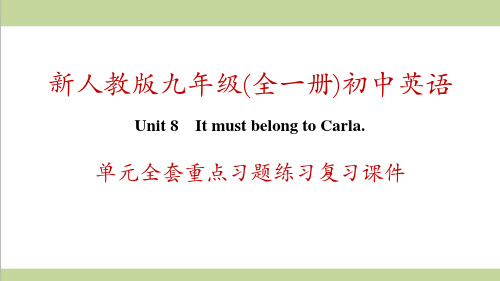
新人教版九年级(全一册)初中英语
Unit 8 It must belong to Carla.
单元全套重点习题练习复习课件
Unit 8 It must belong to Carla.
Period 1 Section A(1a-2d)
一、根据汉语提示写单词, 并背记相应英语词汇 1. His car was taken away on the back of a breakdown __t_r_u_c_k__ (卡车). 2. We decided to have a __p_i_cn__ic__ (野餐) by the lake.
பைடு நூலகம்
4. —Jack, why didn't you answer my phone at 3: 00
yesterday afternoon?
—Oh, sorry. I ____C____ TFBOYS' concert at that
time.
A. attend
B. attended
C. was attending
—Sure. A. possibly B. badly C. lovely D. easily
2023年人教版英语九年级中考复习语法之非谓语动词(动名词、分词)讲义

人教版英语九年级复习之非谓语动词(动名词、分词)非谓语动词是指在句中充当除谓语以外的其他句子成分的动词形式,可作主语、宾语、表语、定语、状语、补足语等,在句中起名词、形容词、副词的作用。
非谓语动词包含三种形式:动词不定式、动名词和分词(现在分词和过去分词)。
考点一:动名词动名词,即动词-ing形式动词的-ing形式由“动词原形+-ing”构成,其否定形式为“not+动词的-ing形式”。
动词的-ing形式在句中可以作主语、宾语、表语、定语、宾语补足语等。
1、作主语动名词作主语,谓语动词用单数,大多数情况下可以和不定式互换Watching TV too much is a waste of time. = To watch TV too much is a waste of time.看电视太久是在浪费时间。
典型例题:1._________ an English club ______ a good way to improve English.A.Joining; isB. Join; areC. To join; isD. Joins; are2. ________ lots of vegetables ________ good for our health.A. Eating; isB. Eat; areC. To eat; isD. Eats; are参考答案:1.A 2. A2、作宾语。
(1).在初中阶段我们需要掌握的后跟动词-ing形式作宾语的词语有dislike, consider, enjoy, finish, imagine, keep, mind, practice, suggest, give up, put off, keep on, be busy, have fun, be afraid of, be good at, be interested in, be \get used to, look forward to, feel like, thanks for等。
人教版九年级英语下册讲义

人教版九年级英语下册讲义本文档是人教版九年级英语下册的讲义,旨在帮助同学们系统掌握本学期的英语知识。
一、单元介绍本学期英语课程共分为六个单元,分别是Unit 7: Earth's Changing Climate, Unit 8: Celebrating Chinese Festivals, Unit 9: A Healthy Lifestyle, Unit 10: A Mystery Story, Unit 11: Technology and You, Unit 12: Travel and Adventure。
每个单元都包含了词汇、语法、听力、口语和阅读等内容。
二、教学目标1. 了解地球的气候变化对人类以及生物的影响,并掌握相关词汇和表达方式。
2. 了解中国的传统节日和相关俗,培养对中国文化的兴趣。
3. 掌握与健康生活方式有关的词汇和语法,学会谈论自己的生活惯和健康问题。
4. 研究阅读和理解推理类故事,并学会运用相关的词汇和句型进行表达。
5. 探索科技对人们生活的影响,并学会运用科技词汇进行交流和讨论。
6. 学会描述旅行和冒险经历,并掌握相关的词汇和句型。
三、教学内容安排每个单元的教学内容按照以下顺序进行:1. 单词和短语的研究:通过词汇练和语境运用,帮助学生掌握新单词和短语。
2. 语法的研究:介绍新的语法知识并进行练,帮助学生运用到实际情境中。
3. 听力练:通过听力材料,培养学生的听力理解能力和语音感知。
4. 口语练:通过角色扮演和对话练,帮助学生提高口语表达能力。
5. 阅读理解练:通过阅读材料,培养学生的阅读理解能力和批判性思维能力。
6. 写作练:通过写作任务,让学生运用所学知识进行写作。
四、教学方法本讲义采用多种教学方法,包括课堂教学、小组合作研究、角色扮演、演讲和讨论等,通过活动和互动培养学生的研究兴趣和综合能力。
五、教学评估每个单元结束后,将进行综合评估,包括听力测试、口语表达、阅读理解和写作任务等,旨在帮助学生巩固所学知识和提高研究成绩。
英语人教版九年级全册初三英语复习教案

初三中考英语总复习教案In the early 1990s,the word”Internet”was strange to most people.But today,Internet has become a useful tool for people all over the world.Maybe Internet has been the greatest invention in the field of communication in the history of mankind(人类)Communicating with others on the Internet is much faster.We can chat with a person who is sitting in the other part of the world.We can e-mail our friends and they can read the e-mails within a minute.Giving all kinds of information is probably the biggest advantage of the Internet.We can use search engines to find the information we need.Just type in a keyword or keywords and the search engine will give us a list of suitable websites to look at.We can enjoy a lot on the Internet by downloading games,visiting chat rooms or surfing (浏览)websites.There are some games for free.We can meet new and interesting people in the chat now.We can also listen to music and see films.Now ,there is a lot of service on the Internet such as online banking ,job finding and ticket buying.We can also do shopping and find nearly all kinds of goods.Sometimes we can find something that is quite good but very cheap.26.How many main advantages of the Internet are talked about in the passage?A.Three.B.Four.C.Five.D.Six.27.What fact doesn’t the passage provide?A.We can find almost anything we want to know on the Internet.B.Some games on the Internet are free.C.We can buy most things we need on the Internet.D.Goods on the Internet are more expensive than those in real shops.28.Which title best gives the main idea of the passage?A.Online ShoppingB.Exchanging Information on the InternetC.The Advantages of the InternetD.Surfing the Websites on the Internet答案: BDCYou want to know about my staying in America,right?Well,to tell you the truth,it is really an eye-opening experience study here.In China,I had English classes five times a week since fifthgrade.However,I didn’t know how different textbook English could be from everyday English until I came to Hotchkiss School,Conmecticut.When I first studied English,I was told to say, “I am fine.”when people say “How are you ?”But in the US,I found that people say, “I am good.”or “Ilm tired.”One day ,someone greeted me with “What’s up ?”It ,made me confused.I thought for a moment and then smiled because I didn’t know what to say.Since then,I have discovered more and more differences between Chinese and US cultures.To my surprise,US girls spend a lot of time in the burning sun to get a tan.However ,in China ,girls try every possible way to get their skin paler,or “whiter.”I also surprised by how hard-working .US students are.InChina,schoolwork is almost everything ,so we study hard and that’it.But here,a “good”student gets good grades,does a lot for the public and plays sports or music.The kids here are so talented ,I am starting to be sorry that I gave up playing the piano at an early age and that I have never thought about sports.61.According to the writer,textbook English is _________everyday English.A.quite different fromB.the same asC.more difficult than62.What does the word “tan ”in the sixth paragraph mean in Chinese?A晒黑B晒白C 能量63.A good US student spends his/her time ________.A.only in doing homeworkB.only on sports or musicC.on studies ,sports or music and public work64.Which of the following is NOT true?A.The writer is now in US.B.American girls love to have white skin. students are talented and hard-working.65.Which is the best title for the passage?A.My Own Travel in the USB.My Studying in the USC.My Opinion about the US答案:AACBBPeople often say that the Englishman’s home is his castle.They mean that the home is very important and personal to him.Most people in Britain live in houses rather than flats,and many people own their homes.This means that they can make them individual(个体的);they can paint them,and change them in any way they like.Most house have a garden,even if it is a very small one,and the garden is usually loved.The house and the garden are the private(私人的)space of the individual.People usually like to mark their space.Are you sitting now in your home or on a train?have you marked the space around yourself asyour?If you are on the train you may put your coat or small bag on the seat beside you.If you share a flat you may have one corner or chair which is your own.Once I was travelling on a train to London.I was in a section for four people and there was a table between us .The man on the space on my side of the table at all. I was angry.Maybe he thought that he owned the whole table.I had read a book about non-verbal communication,so I took various papers out of my bag and put them on his briefcase!When I did this he stiffened and his eyes nearly popped(瞪出)out of his head.I had invaded(侵犯)his space!A few minutes later I took my papers off his case in order to read them.He immediately moved his case to his side of the table.Of course,it is possible that he just wanted to be helpful to me!If you are visiting another country you may feel that you don’t have any private space.Hotel rooms look much the same in every country in the world.All day long ,you share public spaces with o ther pople.You see the local people in their private spaces and you feel lonely and “outside”.Local people can create their private spaces by talking about things you don’t know about .And you even feel that they like you to be outside them so that they will enjoy being inside even more!This is one of the difficulties of being a traveler!But if you understand it then it helps you .Haven’t you enjoyed being part of a group and “owning”a bit of space?41.The writer was angry as he was travelling on a train to London because______.A.he had no place to sitB.someone had invaded his “space”C.too many people shared a section with himD.some other people talked about things he didn’t know about42. “…you feel lonely and ‘outside’”in paragraph 4 means that_______.A.you are alone outside the houseB.you feel lonely because you travel on your ownC.you are alone and therefore you go outside to have some funD.you feel lonely and you don’t belong to that place or that group of people43.In Paragraph 4 ,the pronoun “them’refers to(所指) “___________”.A.public spacesB.private spacesC.local peopleD.other countries44.Which of the following is TRUE according to the passage?A.British people dislike marking their space.B.You always feel at home in another country.C.Most British people prefer living in houses to flats.D.You can’t mark your private space in a foreign country.45.Tha main purpose of the passage is to tell readers to _______.A.own private spaces by living in housesB.have one corner of their own in public placesC.realize the importance of “space”in communicationD.create their private spaces by talking with local people 答案:BDCCC。
定语从句复习讲义--人教版英语九年级全册
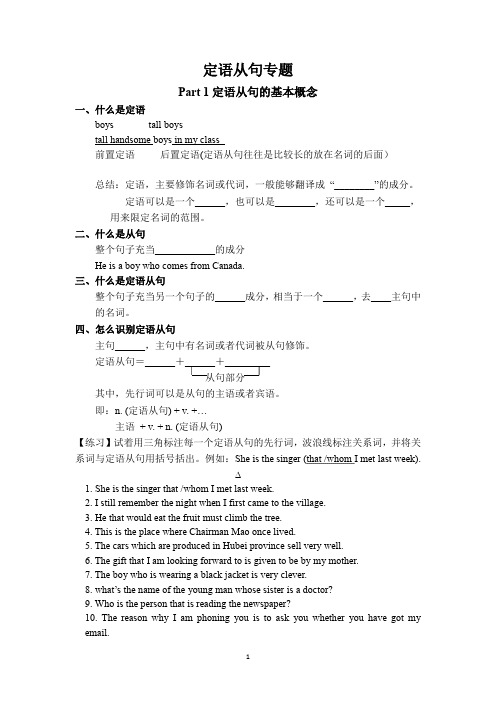
定语从句专题Part 1定语从句的基本概念一、什么是定语boys tall boystall handsome boys in my class前置定语后置定语(定语从句往往是比较长的放在名词的后面)总结:定语,主要修饰名词或代词,一般能够翻译成“________”的成分。
定语可以是一个______,也可以是________,还可以是一个_____,用来限定名词的范围。
二、什么是从句整个句子充当____________的成分He is a boy who comes from Canada.三、什么是定语从句整个句子充当另一个句子的______成分,相当于一个______,去____主句中的名词。
四、怎么识别定语从句主句______,主句中有名词或者代词被从句修饰。
定语从句=______+______+_________从句部分其中,先行词可以是从句的主语或者宾语。
即:n. (定语从句) + v. +…主语+ v. + n. (定语从句)【练习】试着用三角标注每一个定语从句的先行词,波浪线标注关系词,并将关系词与定语从句用括号括出。
例如:She is the singer (that /whom I met last week).∆1. She is the singer that /whom I met last week.2. I still remember the night when I first came to the village.3. He that would eat the fruit must climb the tree.4. This is the place where Chairman Mao once lived.5. The cars which are produced in Hubei province sell very well.6. The gift that I am looking forward to is given to be by my mother.7. The boy who is wearing a black jacket is very clever.8. what’s the name of the young man whose sister is a doctor?9. Who is the person that is reading the newspaper?10. The reason why I am phoning you is to ask you whether you have got my email.Part 2定语从句的具体内容一、先行词:被_____的对象关系______:that, which,who, whom,whose二、关系词关系______:where,when,why三、考点:关系词的选择(一)关系代词的用法(句子______成分)which 物主语/宾语who 人主语/宾语Whom人宾语whose 人/物定语(所有格)that 人/物主语/宾语①人----who/whom/that区分主宾(介词后只用whom)e.g. In this earthquake, the number of people who lost homes reached as many as 250000.e.g. I happened to meet the professor who/whom I got to know at a party.e.g. I have many friends to whom I am going to send postcards.【练习】1.Do you know the man ______ I spoke to?A. whoB. whichC. whyD. where2.The girl ______ is singing an English song in the next room is Tom’s sister.A. whomB. whichC. whoD. where②物----which/that一般情况下可互换,但先行词被以下情况修饰或本身就是以下词时,只能用that的情况:1. the+最高级、序数词:the only/the right/the same/the very/the last/just2. 不定代词:the one, all, little, few, much, everything, anything, nothing, none, some, any, every, no3. 人且物:I can remember the persons and some pictures that I saw in the room.4. 在there be 句型中,从句只用that做主语,不用which。
人教版九年级上册英语复习题unit1-unit10试卷(无答案)
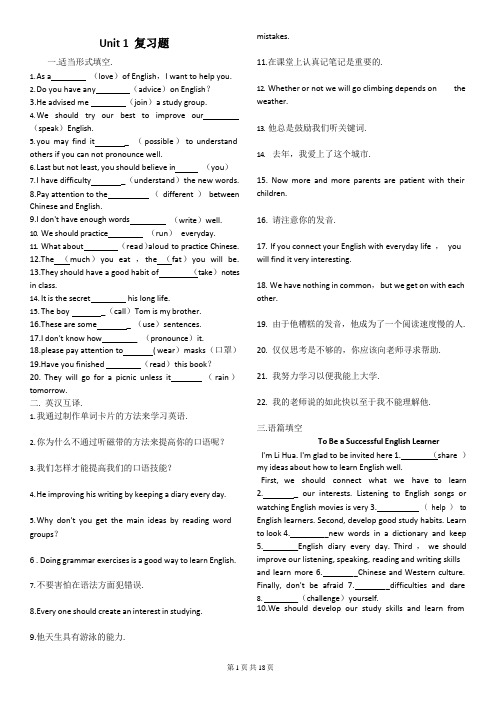
Unit 1 复习题一.适当形式填空. mistakes.11.在课堂上认真记笔记是重要的.1.As a(love)of English,I want to help you.2.Do you have any(advice)on English?3.He advised me (join)a study group.4.We should try our best to improve our (speak)English.5.you may find it_ (possible )to understand others if you can not pronounce well. 12.Whether or not we will go climbing depends on the weather.13.他总是鼓励我们听关键词.14.去年,我爱上了这个城市.st but not least, you should believe in(you)7.I have difficulty_(understand)the new words.8.Pay attention to the(different )between Chinese and English. 15.Now more and more parents are patient with their children.9.I don't have enough words(write)well. 16.请注意你的发音.10.We should practice(run)everyday.11.What about(read)aloud to practice Chinese.12.The(much)you eat ,the(fat)you will be.13.They should have a good habit of(take)notes in class.14.It is the secret his long life.15.The boy _(call)Tom is my brother.16.These are some_ (use)sentences.17.I don't know how_ (pronounce)it.18.please pay attention to( wear)masks(口罩)19.Have you finished (read)this book?20. They will go for a picnic unless it(rain )tomorrow.二.英汉互译.1.我通过制作单词卡片的方法来学习英语.2.你为什么不通过听磁带的方法来提高你的口语呢?3.我们怎样才能提高我们的口语技能?4.He improving his writing by keeping a diary every day.5.Why don't you get the main ideas by reading word groups?6 . Doing grammar exercises is a good way to learn English. 17.If you connect your English with everyday life ,you will find it very interesting.18.We have nothing in common,but we get on with each other.19.由于他糟糕的发音,他成为了一个阅读速度慢的人.20.仅仅思考是不够的,你应该向老师寻求帮助.21.我努力学习以便我能上大学.22.我的老师说的如此快以至于我不能理解他.三.语篇填空To Be a Successful English LearnerI'm Li Hua. I'm glad to be invited here 1.(share )my ideas about how to learn English well.First, we should connect what we have to learn 2._ our interests. Listening to English songs or watching English movies is very 3.(help )to English learners. Second, develop good study habits. Learn to look 4._new words in a dictionary and keep 5._English diary every day. Third ,we should improve our listening, speaking, reading and writing skills and learn more 6. _Chinese and Western culture.7.不要害怕在语法方面犯错误. Finally, don't be afraid 7.8._(challenge)yourself._difficulties and dare8.Every one should create an interest in studying.9.他天生具有游泳的能力.10.We should develop our study skills and learn fromIn 9.(I)opinion, we should read and write in English every day. To practice spoken English, we can also have conversations 10.friends and classmates in English.Thanks for your listening.Unit 2 复习题一.适当形式填空.1.I wish (go) right now. on the weather.3. 每个人天生具有学习的能力。
2021-2022学年八年级升九年级英语人教版暑假专题讲义:初中句型汇总(无答案)

八升九暑假综合复习Day12 初中句型汇总句型1:There+be +句型英语中的there be结构主要表示某处存在有某物,所以通常被称为存在句。
其中的there为引导词,无词义,be为谓语动词,there be后面的名词为句子主语。
There be结构的否定式和疑问式:1、否定式:there be结构的否定式通常应将否定词置于动词be之后:There ______________________ for you. 我帮不了你什么忙。
若谓语中包括有助动词或情态动词,通常将否定词置于助动词与情态动词之后:There _________________ so many mistakes. 不可能有那么多错误。
另外注意以下类型的否定式:There ____________________________ any difficulty over the money question. 在钱的问题上似乎没发生什么困难。
2、疑问式:there be结构的疑问式通常应将否定词置于动词be之后:Is there any good film______________? 映什么好电影吗?若谓语中包括有助动词或情态动词,通常将助动词或情态动词移至句首构成疑问式:_______________________ any new developments? 有什么新的发展吗?另外注意以下类型的疑问式:如:Uncle Jesse, why do there have to be poor people like those? 杰西叔,为什么一定要有他们那样的穷人?There be结构的谓语形式:1、主谓一致问题:若只有一个主语,谓语的数则取决于该主语的数;若有几个主语并列,则通常是与靠近的主语保持一致:There_________a pen and some books on the desk. 桌上有一支钢笔和一些书。
- 1、下载文档前请自行甄别文档内容的完整性,平台不提供额外的编辑、内容补充、找答案等附加服务。
- 2、"仅部分预览"的文档,不可在线预览部分如存在完整性等问题,可反馈申请退款(可完整预览的文档不适用该条件!)。
- 3、如文档侵犯您的权益,请联系客服反馈,我们会尽快为您处理(人工客服工作时间:9:00-18:30)。
用在行为动词的前面 如:I still love him.
5. 害怕…be terrified of sth. 如:I am terrified of the dog.
be terrified of doing sth. 如:I am terrified of speaking.
课程新授
授课题目
九年级全册Unit1-Unit5复习
精
彩
导
学
学习目标
1.掌握宾语从句的用法
2.被动语态的各种语法
教学重难点
1.掌握宾语从句的用法
2.被动语态的各种语法
教学过程
一、复习导入;听写单词,词组;提问重点知识点
二、交代学习目标;课程新授
(1)、展示新知识:精讲知识点,辅以造句、对话等多种形式充足练习,使学生掌握并灵活运用。
②Why don’t you + do sth.? eg:Why don’t you go shopping?
③Why not + do sth. ? eg:Why not go shopping?
④Let’s + do sth. eg: Let’s go shopping
⑤Shall we/ I + do sth.? eg:Shall we/ I go shopping?
16. deal with 处理
17. worry about sb./ sth. 担心某人/ 某事
18. be angry with sb. 对某人生气
19. see sb. / sth. doing看见某人正在做某事 强调正在发生
see sb. / sth. do看见某人在做某事(强调经常看见)
4. too…to太…而不能 常用的句型 too+adj./adv. + to do sth.
5. aloud, loud与loudly的用法三个词都与"大声"或"响亮"有关。
①aloud是副词,重点在出声能让人听见,但声音不一定很大,
常用在读书或说话上。通常放在动词之后。aloud没有比较级和最高级 形式。
I can hardly understand them. I hardly have time to do it.。
9. in the last few years. 在过去的几年内常与完成时连用 如:
I have lived in China in the last few years.
10. be different from 与…不同 (反义词?)
23. with the help of sb. == with one’s help 在某人的帮助下
24. compare … to … 把…与…相比
25.instead 代替用在句末,副词(字面上常不译出来)
instead of sth. / doing sth. 代替,而不是 用在句中,动词
Unit2 I think that moonkakes are delicious
② end up with sth. 以„结The party ended up with her singing.
9. also 也、而且(用于肯定句)常在句子的中间 either 也(用于否定句)常在句末 too 也 (用于肯定句) 常在句末
10. make mistakes 犯错make a mistake 犯一个错误
He says Mary will play with the cat.I think he left yesterday morning.
2) 主句时态是一般过去时,从句要用过去时态的某种形式。
He said Mary was playing with the cat.He said he hoped to be back soon..
②not …any more == not …any longerI don’t play tennis any more/longer.
Unit 3 Could you please tell me where the restrooms are
1. not…until…You never know until you try something。
fifteen years old 指年龄 15岁
15.支付不起… can’t /couldn’t afford to do sth.
can’t / couldn’t afford sth.
16. as + 形容词./副词+as sb. could/can 尽某人的…能力
17. get into trouble with 遇到麻烦
3) 当从句所表示的是客观事实或客观真理时,该从句都用一般现在时,不用过去时。如:He said light travels much faster than sound.
3、 宾语从句中的否定转移。如果主句谓语动词是think , believe suppose 等,而从句的意思是否定的,这时主句的谓语动词用否定式,从句用肯定式。如:
6.be worried about sb./sth.担心某人/某事 worried 是形容词
8. hardly adv. 几乎不、没有 hardly ever 很少
hardly 修饰动词时,通常放在助动词、情态动词之后,实义 动词之前
助动词/情态动词+hardly hardly + 实义动词 如:
(2)采取多种形式检查学生对语法项目的掌握情况,
三、目标测试:(辅以专项习题练习)
四、总结归纳
五、作业布置
授课内容
Unit1 How can we become good learners?
1.by + doing 通过……方式eg:by studying with a group
by还可以表示:“在…旁”、“靠近”、“在…期间”、“用、” “经过”、“乘车”等
18. make a decision 下决定 下决心
19. to one’s surprise 令某人惊讶
20. take pride in sth. 以…而自豪
21. pay attention to sth. 对…注意,留心
22. give up doing sth. 放弃做某事
23.不再①no more == no longer 如I play tennis no more/ longer.
2)、 由what , when , where, which, who, how ,why等连接代词或连接副词引导。(特殊疑问句)Do you know where he lives
3)、 由连词whether或if引导(口语中常用if)。(一般疑问句)Could you tell me if it snows in Australia?
come in 进来; come back 回来
4.宾语从句(The Object Clause)在复合句中作主句的宾语。宾语从句通常由下面一些词引导。
1)、 由that引导(that在口语或非正式文体中常省略)(陈述句)。
He said that his father was fifty years old
2. suggest作动词,意为“建议;提议”;名词形式是________________3Βιβλιοθήκη advice(可数/不可数,n/v?)
3. come on快点同义短语:be quick, hurry up。
由come构成的短语还有:come true 实现; come up 上升,出现;
come up with 提出,想出; come out 出来,出版;
2.talk about 谈论,议论,讨论talk to sb (侧重于一个人说,一个人听)= talk with sb. 与某人说话(侧重于两个人互相讨论)
3. 提建议的句子:
①What/ how about +doing sth.? eg:What/ How about going shopping?
They hardly understood it, did they?他们几乎不明白,不是吗?
3.be interested in sth./doing stn 对(做)…感兴趣
interested adj. 感兴趣的,指人对某事物感兴趣,往往主语是人
interesting adj.有趣的,指某事物/某人具有趣味,主语往往是物
11. make sb./ sth. + 形容词make you happy
make sb./ sth. + 动词原形make him laugh
13. help sb. with sth. 帮某人某事 help sb. (to ) do sth. 帮某人做某事
14. fifteen-year-old 作形容词 15岁的 fifteen-year-olds 作名词指15岁的人
11. laugh at sb. 笑话;取笑(某人)
12. make up 组成、构成
13. one of +(the+ 形容词最高级)+名词复数形式 …其中之一
14. It’s +形容词+(for或者of. ) sb to do sth. (对于某人来说)做某事…
15. decide to do sth. 决定做某事
应注意的几个问题:
1.宾语从句可放在形容词后。常用形式是be+形容词+宾语从句I am glad you like it .
2、 宾语从句与主句时态的一致。
1)主句是现在(或将来)时态时,宾语从句可根据实际需要用不同的时态。
